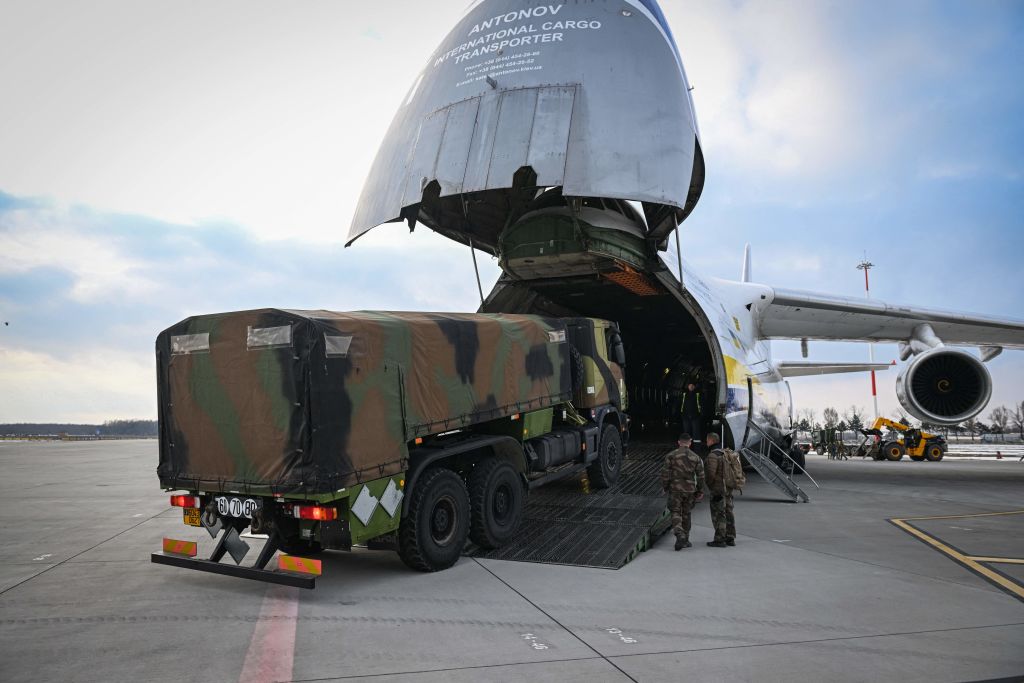The U.S. has moved a massive amount of arms into Ukraine since Russia's invasion, but the window is closing


A free daily email with the biggest news stories of the day – and the best features from TheWeek.com
You are now subscribed
Your newsletter sign-up was successful
Within 48 hours of President Biden approving a $350 million security aid package for Ukraine on Feb. 26, two days after Russia invaded the country, the first shipment of U.S. weapons were arriving at airfields near Ukraine's border, ready for transfer to Ukrainian Soviet-era transport planes, U.S. officials tell The New York Times. "In less than a week, the United States and NATO have pushed more than 17,000 antitank weapons, including Javelin missiles, over the borders of Poland and Romania," to Kyiv and other major cities.
The "vast majority" of the $350 million package, or about $240 million worth of arms, has already been delivered to Ukraine, and the rest should cross the border in days or weeks, "but not longer," a U.S. official told CNN on Friday. So far, the Times reports, "Russian forces have been so preoccupied in other parts of the country that they have not targeted the arms supply lines, but few think that can last."
"The window for doing easy stuff to help the Ukrainians has closed," Maj. Gen. Michael S. Repass, a former commander of U.S. Special Operations forces in Europe, told the Times. Along with the U.S., 13 other countries have sent security assistance to Ukraine, CNN reports, including traditionally neutral countries like Sweden.
The Week
Escape your echo chamber. Get the facts behind the news, plus analysis from multiple perspectives.

Sign up for The Week's Free Newsletters
From our morning news briefing to a weekly Good News Newsletter, get the best of The Week delivered directly to your inbox.
From our morning news briefing to a weekly Good News Newsletter, get the best of The Week delivered directly to your inbox.
"To understand the warp-speed nature of the arms transfers underway now, consider this: A $60 million arms package to Ukraine that the U.S. announced last August was not completed until November," the Times reports.
The U.S. is also assisting Ukraine with intelligence on Russian troop movements and is conducting cyber operations from bases around Eastern Europe, but Biden has laid strict ground rules to prevent the U.S. from being drawn into a direct war with nuclear-armed Russia, the Times reports. For example, not even U.S. surveillance aircraft is being allowed to fly over Ukraine, and only general intelligence is being passed on to Ukraine's military and intelligence agencies, in part because U.S. officials are convinced they are "populated with Russian spies" and in part so as not to "give Russia an excuse to say it is fighting the United States or NATO, not Ukraine."
Editor's note: This article incorrectly said the U.S. aid package was $350 billion, not $350 million. We apologize for the mistake.
A free daily email with the biggest news stories of the day – and the best features from TheWeek.com
Peter has worked as a news and culture writer and editor at The Week since the site's launch in 2008. He covers politics, world affairs, religion and cultural currents. His journalism career began as a copy editor at a financial newswire and has included editorial positions at The New York Times Magazine, Facts on File, and Oregon State University.
-
 Nuuk becomes ground zero for Greenland’s diplomatic straits
Nuuk becomes ground zero for Greenland’s diplomatic straitsIN THE SPOTLIGHT A flurry of new consular activity in the remote Danish protectorate shows how important Greenland has become to Europeans’ anxiety about American imperialism
-
 ‘This is something that happens all too often’
‘This is something that happens all too often’Instant Opinion Opinion, comment and editorials of the day
-
 House votes to end Trump’s Canada tariffs
House votes to end Trump’s Canada tariffsSpeed Read Six Republicans joined with Democrats to repeal the president’s tariffs
-
 The mission to demine Ukraine
The mission to demine UkraineThe Explainer An estimated quarter of the nation – an area the size of England – is contaminated with landmines and unexploded shells from the war
-
 The secret lives of Russian saboteurs
The secret lives of Russian saboteursUnder The Radar Moscow is recruiting criminal agents to sow chaos and fear among its enemies
-
 Is the 'coalition of the willing' going to work?
Is the 'coalition of the willing' going to work?Today's Big Question PM's proposal for UK/French-led peacekeeping force in Ukraine provokes 'hostility' in Moscow and 'derision' in Washington
-
 Ukraine: where do Trump's loyalties really lie?
Ukraine: where do Trump's loyalties really lie?Today's Big Question 'Extraordinary pivot' by US president – driven by personal, ideological and strategic factors – has 'upended decades of hawkish foreign policy toward Russia'
-
 What will Trump-Putin Ukraine peace deal look like?
What will Trump-Putin Ukraine peace deal look like?Today's Big Question US president 'blindsides' European and UK leaders, indicating Ukraine must concede seized territory and forget about Nato membership
-
 Ukraine's disappearing army
Ukraine's disappearing armyUnder the Radar Every day unwilling conscripts and disillusioned veterans are fleeing the front
-
 Cuba's mercenaries fighting against Ukraine
Cuba's mercenaries fighting against UkraineThe Explainer Young men lured by high salaries and Russian citizenship to enlist for a year are now trapped on front lines of war indefinitely
-
 Ukraine-Russia: are both sides readying for nuclear war?
Ukraine-Russia: are both sides readying for nuclear war?Today's Big Question Putin changes doctrine to lower threshold for atomic weapons after Ukraine strikes with Western missiles
